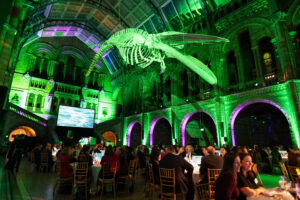Fixing Our Broken Planet
Fixing Our Broken Planet is a collaborative partnership between the Natural Environment Research Council (NERC), part of UK Research and Innovation, and the Natural History Museum.
It is designed to showcase the breadth of environmental science and the groundbreaking work of NERC-funded researchers.
At the heart of the programme is the development of a new gallery, expected to attract 2.5 million to 3 million visitors annually.
Visitors will be given practical, evidence-based choices they can take to combat the planetary emergency while getting up close to over 250 specimens including a Sumatran rhinoceros.
The new gallery will house a semi-permanent exhibition (spanning 10 years) celebrating, among others, the impact of NERC-funded research.
It will begin with the 2023 Impact Awards.
Over its lifetime, it will evolve to feature new evidence gained from NERC-funded environmental science research, ensuring the exhibition remains at the cutting edge of knowledge.
This collaborative partnership connects researchers with the public, demonstrating how environmental science is relevant to our everyday lives.
By bringing people together to explore realistic, achievable solutions to the climate crisis, Fixing Our Broken Planet aims to foster collaboration, inspire fresh perspectives and encourage collective action to protect our planet.
Find out more about Fixing Our Broken Planet at the Natural History Museum.
NERC Impact Awards

The NERC Impact Awards ceremony in the Hintze Hall at the Natural History Museum, London, 2023. Credit: NERC
The Impact Awards celebrate and champion the work of NERC-funded researchers and the positive impact they bring to our everyday lives across our society, the economy and the environment.
The awards shine a spotlight on the vital role of environmental science in responsibly managing our planet.
People are at the heart of the science we fund.
The competition is designed to celebrate the wide range of people and roles in the environmental science research community who contribute to impactful research.
2023 awards
Celebrating impact
Professor Peter Liss, Interim Executive Chair of NERC, said:
The 2023 NERC Impact Awards recognise the remarkable work of our environmental science community. The research of our winners, finalists and all this year’s entries is tackling some of the planet’s most pressing issues.
These include tracking COVID-19 during the pandemic in our wastewater, informing England’s biodiversity net gain policy and helping shape the global discourse on tackling climate change.
The inspiring impacts demonstrate the huge benefits that environmental science brings to our society, economy and environment.
I would like to congratulate the winners and finalists of this year’s NERC Impact Awards.
Recognising and rewarding scientists
The awards were judged by independent panels of academic, industry, government and public engagement figures using the Research Excellence Framework impact criteria of reach and significance.
The panels were chaired by Professor Kathryn Monk, Chair of the international Collaboration for Environmental Evidence and Honorary Professor at Swansea University.
Winners were announced at a ceremony at the Natural History Museum, London on 29 November 2023. Read the impact stories of 2023’s NERC Impact Award winners and finalists in the 2023 Impact Awards brochure and watch videos showcasing their work on YouTube.
Overview of the winners, finalists and commended entrants:
